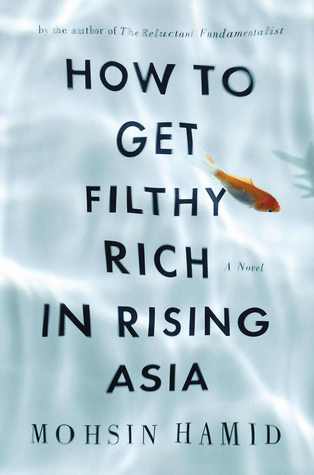How to Get Filthy Rich in Rising Asia by Mohsin Hamid
New York. Riverhead. 2013. ISBN 9781594487293
 When we meet the protagonist of Mohsin Hamid’s novel, he is “huddled on the packed earth” under his mother’s cot, feverish and suffering from hepatitis E. A momentous event is about to occur, as the boy’s father agrees to take his family from the village to live in the city. Life in the village is hard. People toil for little gain, age quickly, and suffer the vagaries of nature. The city offers education, work, and a chance to leave poverty behind and become wealthy in the booming economy of Asia. Written as a self-help guide addressed to the protagonist, Hamid’s book deliberately withholds the specific details customarily found in a novel. The setting is never identified, characters remain nameless, and the plot is streamlined. Each chapter begins by discussing a topic germane to the pursuit of wealth. “We find ourselves broaching the topic of violence. Becoming filthy rich requires a degree of unsqueamishness.” Then the chapter narrates how the protagonist takes the appropriate steps as he develops from small-time hustler to the prosperous head of a bottled water company, wheeling and dealing in a world secured by armed guards and serviced by chauffeurs, cooks, and personal staff. The protagonist has come a long way from the feverish boy who might have died young in rural deprivation.
When we meet the protagonist of Mohsin Hamid’s novel, he is “huddled on the packed earth” under his mother’s cot, feverish and suffering from hepatitis E. A momentous event is about to occur, as the boy’s father agrees to take his family from the village to live in the city. Life in the village is hard. People toil for little gain, age quickly, and suffer the vagaries of nature. The city offers education, work, and a chance to leave poverty behind and become wealthy in the booming economy of Asia. Written as a self-help guide addressed to the protagonist, Hamid’s book deliberately withholds the specific details customarily found in a novel. The setting is never identified, characters remain nameless, and the plot is streamlined. Each chapter begins by discussing a topic germane to the pursuit of wealth. “We find ourselves broaching the topic of violence. Becoming filthy rich requires a degree of unsqueamishness.” Then the chapter narrates how the protagonist takes the appropriate steps as he develops from small-time hustler to the prosperous head of a bottled water company, wheeling and dealing in a world secured by armed guards and serviced by chauffeurs, cooks, and personal staff. The protagonist has come a long way from the feverish boy who might have died young in rural deprivation.
Given the poverty from which many people in Asia would like to escape, Hamid wisely does not overtly critique the protagonist’s aspirations. But the novel suggests that living primarily in order to become filthy rich comes at a cost. Hamid’s prose style is wry, laconic, and detached. Because he doesn’t supply many details about his characters, they remain superficial types, and this superficiality serves to question the meaning of a life dedicated to riches. Who, really, is the main character? He becomes successful, yet we wonder if he truly knows himself, perhaps because we never know him either. We learn of significant events—such as his marriage, his separation from his wife, or the death of his father—almost parenthetically, as if such details would detract from the pursuit of lucre. In a passage about the protagonist’s accountant, we read that “his sons are employed. His daughter is married, to you, a fellow clansman.” That a detail so intimate to the protagonist’s life as his own marriage could be revealed in such an alienating manner is part of the novel’s insight. Only at the end of his life, when he has lost his fortune, does the protagonist experience meaningful transcendence. “You are ready to die . . . for despite all else you have loved . . . you have been beyond yourself, and so you have courage.”
Going beyond oneself, the novel suggests, and not the cars, deals, and power associated with riches, is something worth struggling for.
Jim Hannan
Le Moyne College




